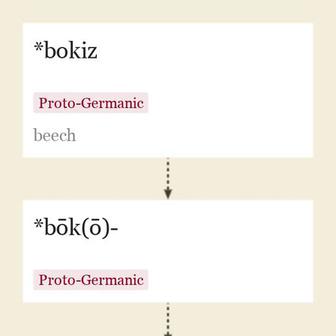bookmark n.
also book-mark, "
Entries linking to bookmark

Middle English bok, from Old English boc "
Latin and Sanskrit also have words for "
The sense gradually narrowed by early Middle English to "
The use of books or written charters was introduced in Anglo-Saxon times by the ecclesiastics, as affording more permanent and satisfactory evidence of a grant or conveyance of land than the symbolical or actual delivery of possession before witnesses, which was the method then in vogue. [Century Dictionary]
From c. 1200 as "
"
The primary sense "
The Middle English sense of "
In medieval England and in Germany, "
updated on July 09, 2017